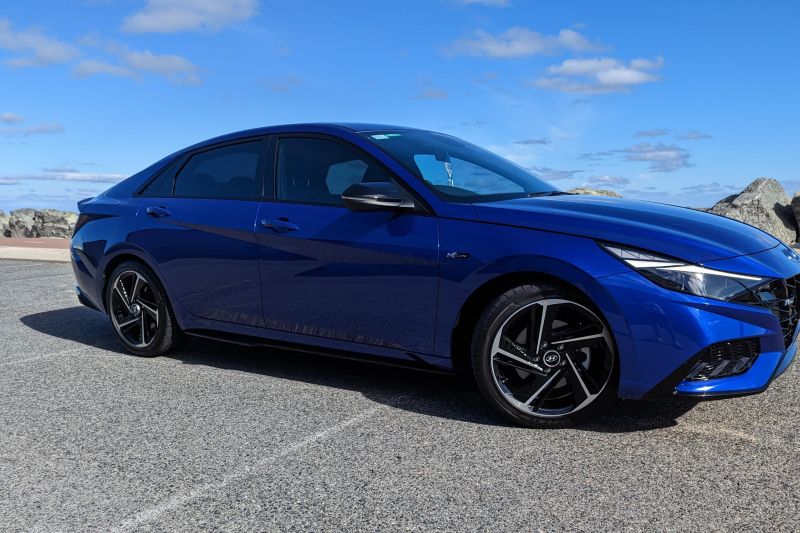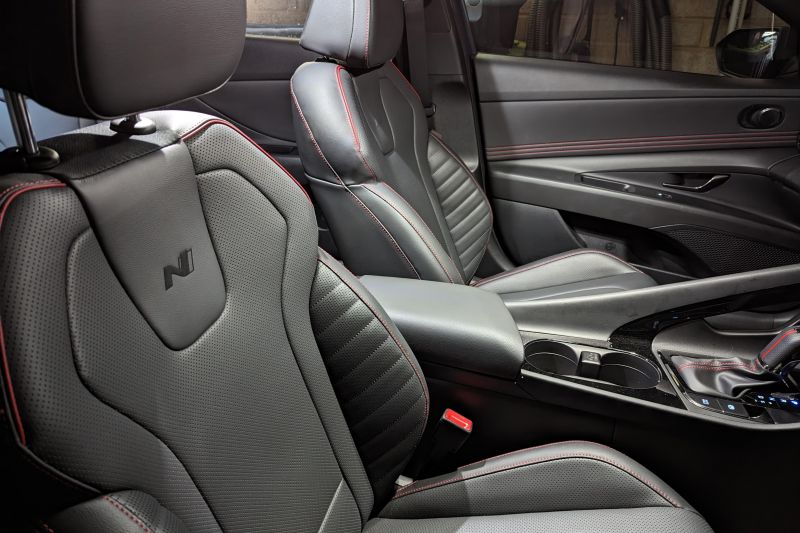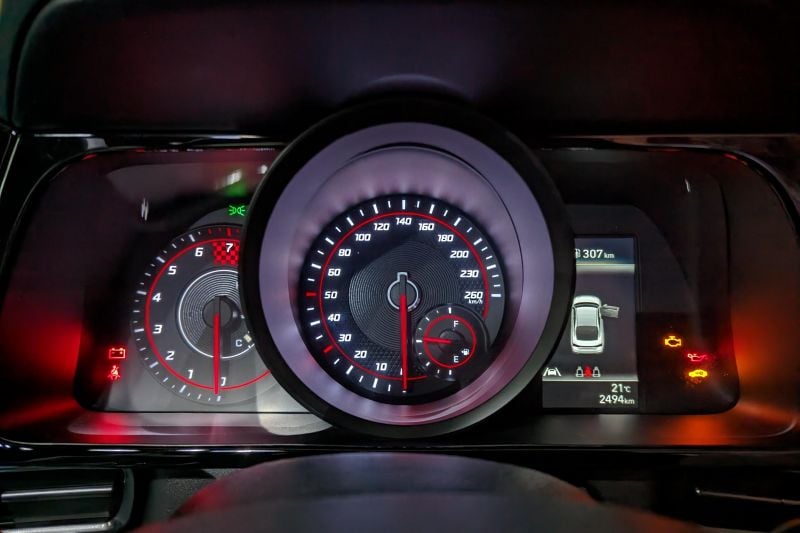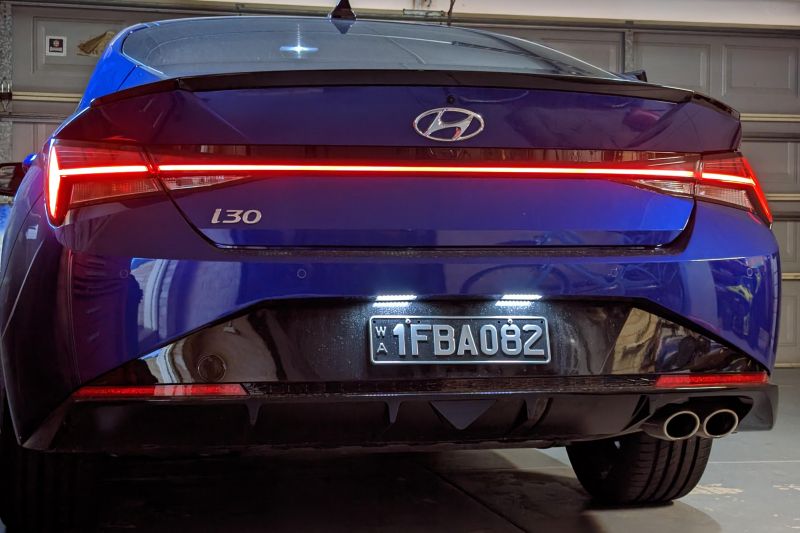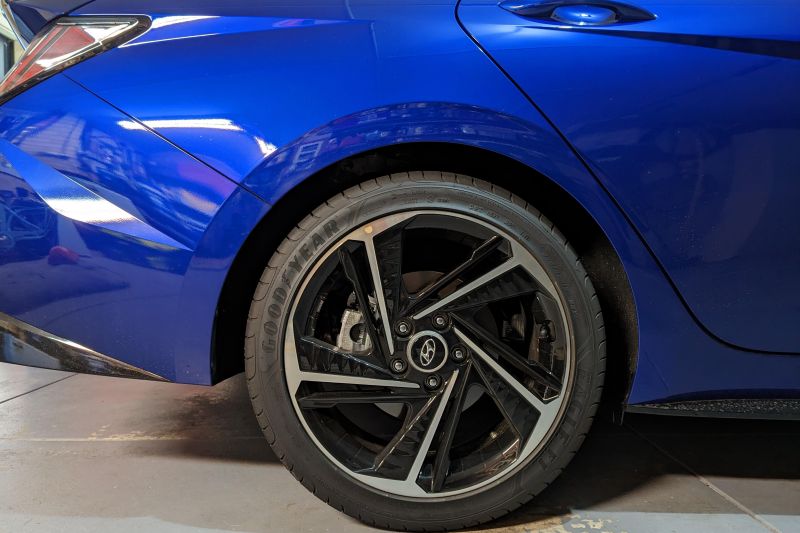About the Hyundai i30
Ryan M purchased this Hyundai i30 new for $36,961 (including all on-road costs). Ryan M would buy this car again because: “It’s a sedan! Remember sedans? They are comfortable, spacious, fuel efficient, and handle well. The i30 was one of very few options in the small sedan under $40k segment, which is a shame but that’s what the market dictates. It’s been an enjoyable experience and the polarising design draws a lot of attention (for better or worse). “
How reliable has your car been? Tell us about any issues.
Hyundai hasn’t always been synonymous with “reliability”, particularly in the US where some of their vehicles are (poorly) manufactured there. But in recent years, Hyundai has turned itself around and climbed the reliability ranks, at least statistically.
This gave me confidence to go ahead and purchase a new Hyundai with a five-year warranty. Not everyone is fortunate enough to be in the position to buy a new car, but the current circumstances of the used car market have made it a no-brainer.
The i30 Sedan N-Line has had no issues so far, which is what I would expect from a new car. It’s difficult to assess the overall reliability only four months in, but some assumptions can be made from being part of Facebook owner groups and some personal experiences with the car.
However, if I were to predict the first component to fail, it would be the dual-clutch transmission. I’ll preface this by saying I’m a bit of a car nerd and I’ve driven a VW Golf with a seven-speed DSG for months before owning the i30, so I’m familiar with its oddities and mannerisms. I also love the sporty feel, which pairs nicely with the turbocharged engine.
Stepping into the i30, I feel like the DCT is weaker than the Volkswagen one.
One main point of concern is the delay from reverse to drive. I understand DCTs are inherently laggy sometimes when switching from reverse to drive, but in the i30 it’s a solid two second delay, every time. There were other instances of excessive delay too, including engaging first gear and accelerating to overtake.
The worst experience for me was trying to overtake a car which suddenly stopped – I put my foot down and there was an orchestra of slipping, clunking and high RPM but no movement. Are these experiences characteristic of the DCT? Maybe. But the DCT appears to be the #1 fault according to other owners of N-Line i30s. Time will tell.
What do you think of the ownership experience with your car?
The i30 has been very enjoyable to drive and own. It’s comfortable and roomy. I feel like Hyundai have cheated the “small car” categorisation a little bit, because the boot is massive and there is plenty of leg room in the back seats. They also are cheating the sales figures by their silly decision to name the car the “i30” Sedan despite the car not sharing a platform, design language or even the engines (the sedan uses the newer SmartStream engine family) as the extremely popular hatchback counterpart.
And this is probably my biggest issue with the car. Yes, I know it’s ridiculous to complain about the model name of a car, but trying to explain to everyone that I have an i30 SEDAN which isn’t the hatch and it’s a TOTALLY DIFFERENT CAR is almost impossible. It should be called the Elantra!
This has been the second car I’ve owned. My first car was a 2007 Holden Calais with a big ol’ V8 which sipped an Earth-shattering 17L/100km. I sold the Calais for almost double what I originally paid for it, shamelessly exploiting the used car market and the “RIP Holden” situation.
I then borrowed a Volkswagen Golf for a few months while waiting for the i30 to be delivered. I mention all this because the biggest thing for me is the fuel economy. Going from 17L/100km to just 7L/100km in the i30 has been great, not just for saving money but it just felt more environmentally practical considering most of my driving is city/suburban. The fun with V8 power has come to an end.
How has the purchase and aftercare experience been with your car?
I really didn’t want to deal with the car dealership directly, as there’s always horror stories about aftermarket accessories, refusal to negotiate pricing, pushy salespeople, etc. So I went with an auto broker service.
The service itself was great. Within 48 hours they called me with a deal saving just under $2000, and it included a full tank of fuel and delivery to my house. I didn’t want the delivery, as I wanted the experience of picking the car up and driving it home, but I can see how some people would. After the contract was signed, the agonising six-month wait began.
Six months wasn’t bad, comparing it to other brands (*ahem* Toyota) makes it seem reasonable. But it was certainly an exercise in patience. Towards the end of the six months was when the dealership contact started, and this was a mixed bag of experiences.
I had to contact the dealer any time I wanted an update on the vehicle status. I was given three different ETAs, which were all wrong. The first one was the beginning of March – this was the initial ETA from the order date. Then, I contacted the dealer in mid-Feb asking for an update.
They responded with “Feb 29”. The car wasn’t there Feb 29, because I called on that day and the dealership said the car will actually arrive in “two weeks”. Two weeks later, still not there. Confused yet? Because the dealer representatives were also confused. Finally, they said the car is at the port and will arrive “any day now”. This was towards the end of March, and I finally picked it up March 26. So yes, it took six months, but there was a lot of uncertainty throughout.
I don’t want to be too harsh on the dealership though, I understand they were extremely busy and had to deal with issues such as port quarantine and other delays. I’ve also heard much, much worse experiences. In terms of aftercare, the service centre is surprisingly nice and very easy to deal with, probably due to the car being new.
Are you happy with the price and features of your car?
The i30 is a lot of car for the money. Hyundai has gone from “cheap” to “good value”, and their current strategy is to wrap a good set of features and attainable price in an extremely polarising design that sells. All their cars have outlandish designs which are obviously not for everyone, but it’s clearly working for the brand.
When the i30 Sedan was first revealed in 2020, I did not like the design. I thought the rear end was trying too hard at being futuristic, like it was over-designed. It did grow on me, and seeing the car in-person before buying sold me. It’s striking, especially in the Intense Blue colour. It does look awkward in some angles, and some people think it’s just totally ugly, but I’ve really enjoyed how it looks overall.
It’s got everything you expect: phone mirroring, every advanced safety feature imaginable, folding mirrors, auto wipers, auto LED headlights… it goes on. I didn’t opt for the Premium spec – while it represents better value with the Bose speakers, big screens, sunroof, power heated/cooled seats for only a few grand more, I wanted to keep things under $40k. The N-Line spec was fine for me.
The biggest surprise though is the quality of the interior. All the buttons and switches feel good, and the indicator stalk is perfectly dampened as if it were refined for centuries. Materials are nice in all the right places in the interior, and there are no creaks, squeaks or rattles. This makes the car feel more premium than it is.
What do you think of the performance and economy of your car?
The 1.6 turbo engine paired with the dual-clutch transmission is a great combo for a car of this size and shape. It’s not actually that quick, with a 0-100 time of around 7.5 seconds. It’s a nice middle ground between the (presumably) slow 2.0 base engine and the 2.0T engine in the proper N performance version. For everyday driving, it’s perfectly adequate. It also has a very subtle exhaust note, because why not?
The DCT shifts very fast and I love the mechanical feel of it. Obviously, it’s not as mechanical as a manual, which is available for this car. But I’m a Gen-Z, do you really think I know how to drive a manual car? Despite its occasional quirks and hiccups, it makes the driving experience fun.
The car has four drive modes: normal, eco, sport and smart. Eco and Sport completely transform how the transmission behaves. In particular, Sport mode is so aggressive with how long it holds gears for and downshifts so early like it’s a learner driver. It’s a bit of a laugh, but mostly impractical for everyday driving.
Eco dulls the car down in the opposite direction as Sport mode. Smart mode tries to choose the drive mode based on your inputs, and it works well most of the time. I find the Normal mode to be a little more economy focused, while Sports mode is overkill – therefore Smart mode is generally what I find to be using the most.
Like I mentioned previously, fuel economy is great. I get a long-term average of 7.0L/100km on a cycle of mostly city driving, and when I’m doing mostly highway driving it drops down to around 5.5L/100km. So overall, the i30 has been very fuel efficient while maintaining a fun driving experience. Can’t complain much.
What do you think of the technology in your car?
The tech is good. The infotainment system is just Hyundai’s basic 8.0 inch display with wireless Android Auto and Apple CarPlay, and some standard radio features. Android Auto has dropped out occasionally, both wired and wireless, but it hasn’t been a deal-breaker than it’s probably just my phone acting up.
The six-speaker stereo is fine, people complain about it in owner groups (they even complain about the upgraded Bose system), but car audio isn’t a major thing for me. A subwoofer and amplifier upgrade would probably improve it dramatically, but it does the job.
Probably the most high-tech component of the i30 is the safety tech, which is pretty much standard on every new car these days. I find it useful only sometimes, like using lane centring when I’m cruising on the freeway, or reaching from the back seats to grab something momentarily. But I find most of it gimmicky at best, and intrusive at worst.
The system screams at me often, like an extremely nervous mum taking her son on his first drive in peak-hour traffic. BRAKE! STAY IN YOUR LANE! DON’T CHANGE LANES! – These are the phrases I interpret in my head when I hear those haunting beeps from the dash. I can see how it could prevent accidents, as we can’t all be perfect drivers (admit it), but probably 95 per cent of the time it’s unnecessary.
I’m also grateful this car DOESN’T have auto stop-start. If you’ve driven a car with that feature before, you’ll know what I’m talking about. So bonus points for that.
What do you think of the ride comfort and handling of your car?
The i30 handles pretty well, definitely better than the Calais which weighed 500kg more and was aging poorly. The suspension feel is perfect for comfortable driving without being too firm or soft. It handles well around corners and the Goodyear tyres are not too bad. The seats are very comfortable and nicely bolstered.
One downside to the comfort is the road noise – there’s heaps of it. The most I’ve experienced in a car (excluding vans and utes). It seems to be from the tyres, as it was slightly reduced after inflating the tyres to their correct PSI. The only solution to this is the radio.
